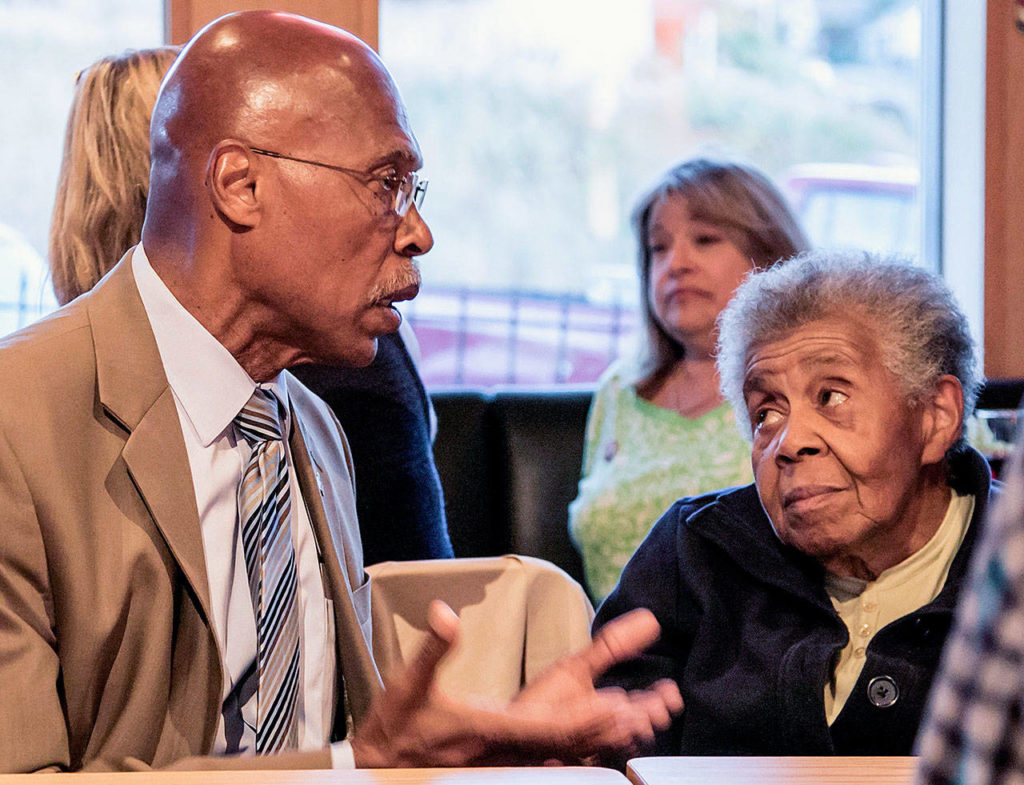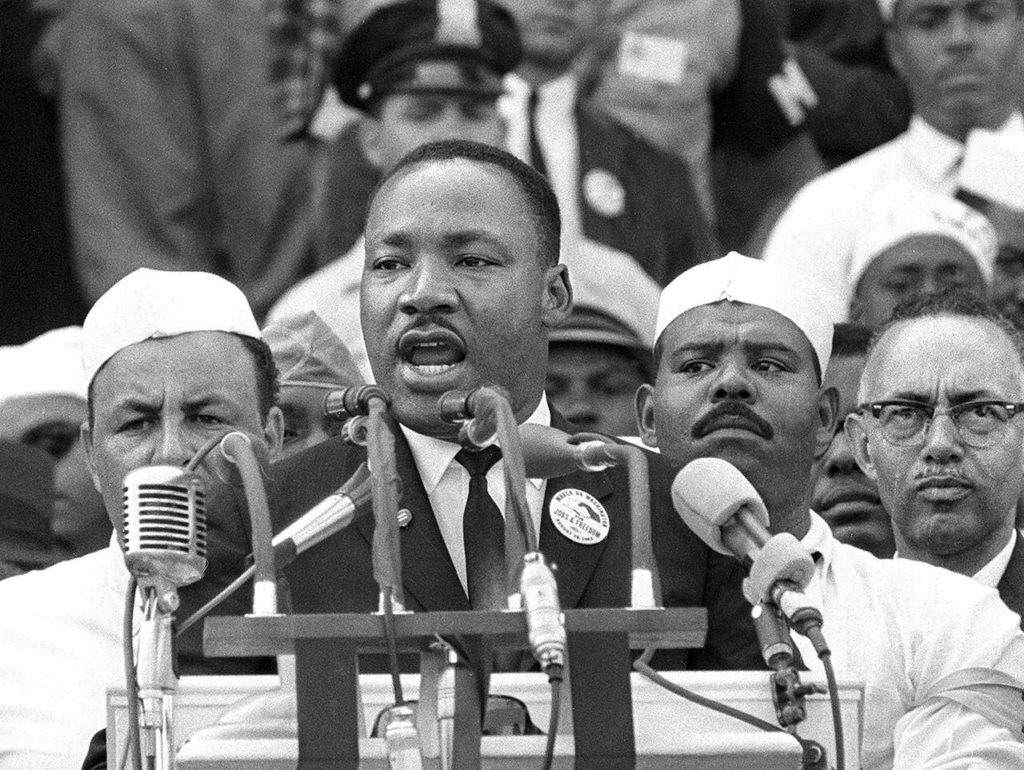Listen carefully to Chet Huntley’s NBC News broadcast from April 4, 1968. It ends with a sad sigh. First came this: “Martin Luther King Jr. was killed tonight in Memphis, Tennessee, shot in the face as he stood alone on the balcony of his hotel room.”
Fifty years have passed, but his words ring as true today as they did that night.
“This country and every person in it suffered a terrible loss tonight with the assassination of this man,” Huntley said. “This stirring and gifted voice of restraint is now silent. … Restraint, gentleness, charity — virtues we so desperately need have had a dark day.”
John Lovick remembers. Marian Harrison remembers. Ben Young remembers.
“When Dr. King was killed, I just felt that hope was lost,” Lovick said Monday. A former Snohomish County executive and previously county sheriff, the Mill Creek Democrat now represents the 44th District in the state House.
At 66, Lovick has come far from tiny Robeline, Louisiana. When the civil rights leader was killed, Lovick was a senior at Allen High School, once known as the Allen High School for Negroes. Despite the Civil Rights Act of 1964, segregation was the order of the day in Robeline.
“I never had a white classmate,” Lovick said. He didn’t have TV or even running water in the house where he was raised by his grandmother, Elsie Lee Lovick. Still, King’s “I Have a Dream” speech at the 1963 March on Washington had given Lovick hope that change was coming.
He remembers getting on the bus to school the morning after King was killed. Unlike most days, kids didn’t say a word. At school, the principal called everyone, first through 12th grades, to the gym for an assembly.
“We just watched it all on TV that morning, and watched the destruction around the country,” Lovick said. “The overwhelming thing I remember thinking, hope was lost. It was a really, really spirit-crushing time.”
Marian Harrison, 87, grew up a world away from the segregated South. She, too, became active in politics, but her memories of the 1960s are vastly different from Lovick’s. A 1949 graduate of Marysville High School — and perhaps its only African-American student at the time — Harrison grew up on a farm outside Arlington on Jordan Road.
She lost her first husband in the Korean War. By the time of King’s death, she was raising seven children in Arlington. Harrison doesn’t recall exactly where she was when she first heard King was dead. “I had seven kids,” she said.
Nor can she remember any tributes in King’s honor in Arlington schools, where she worked as a teachers aide and later as a custodian. King’s “I Have a Dream” speech had coincided with her oldest son’s birthday. Like Lovick, her son, Lyman Lewis — named for the dad lost in Korea — graduated from high school in 1968.
Harrison is proud that all her kids graduated from Arlington High School. And she holds dear King’s 1963 speech, especially that “children will one day live in a nation where they will not be judged by the color of their skin, but by the content of their character.”
Through her local political involvement, Harrison saw African-American candidates in the national spotlight. In 1988, she attended the Democratic National Convention in Atlanta. Pledged to support Michael Dukakis, she also saw the rousing speech of the Rev. Jesse Jackson, who came in second to Dukakis in the delegate race. “You must never stop dreaming,” Jackson said.
While in Atlanta, Harrison visited the King Center, next to the Ebenezer Baptist Church’s Heritage Sanctuary, and the site of the civil rights leader’s tomb.
To her delight, she was elected in 2012 to go to the Democratic convention in Charlotte, North Carolina, and was thrilled to hear President Barack Obama nominated for a second term. “Oh, it was great,” she said. “I can still hear those voices. They raised the roof.”
At 63, Everett’s Ben Young remembers the 1963 March on Washington and King’s death. His family lived in the nation’s capital in 1963. “When they marched through, I was playing on the front stoop. It was amazing,” said Young, a member of the Snohomish County Chapter of the NAACP.
Now vice chairman of the Communities of Color Coalition, Young is chairman of a group planning the seventh annual North Puget Sound Conference on Race. It’s scheduled for 8:30 a.m.-2 p.m. April 28 in Woodway Hall at Edmonds Community College.
When King was assassinated, “we had the riots in D.C.,” Young said. His family moved to North Carolina, which had a much smaller percentage of African-Americans than their former home. “It was a culture shock,” he said.
He recalled race riots at Seventy-First High School, then a campus in North Carolina’s Cumberland County. “The county sheriff came out and they beat us,” said Young, who is retired from Snohomish County government.
Young said the goal for the Conference on Race is for people to find something they can “incorporate into everyday life.”
He believes he has evolved, just as the messages of King and Malcolm X evolved during the civil rights movement. “I’m very appreciative of them bringing the message,” Young said.
Lovick and Harrison are discouraged by the country’s current leadership, and that King’s sacrifices for equality and justice are not being honored. “People are doing things and saying things now, I’m really troubled,” Lovick said.
Harrison, a great-grandmother, sees a need to keep fighting for what King fought for — “to do it all again today.”
“I think Martin Luther King would cry that we have stepped backwards,” she said.
Julie Muhlstein: 425-339-3460; jmuhlstein@heraldnet.com.
Race conference
The seventh annual North Puget Sound Conference on Race, with the theme “Equitable Justice — A Fundamental Right,” is scheduled for 8:30 a.m.-2 p.m. April 28 at Woodway Hall on the Edmonds Community College campus, 20000 68th Ave. W., Lynnwood. Sponsors include the Communities of Color Coalition, the Snohomish County Chapter of the NAACP, EdCC and other local partners.
Christian Paige, an educator, first-generation college graduate, spoken-word poet and co-founder of the Hope Initiative, will deliver the keynote speech.
Toyia Taylor, founder of We.APP (We Act Present Perform), will also speak. Her organization focuses on teaching people to speak with purpose and work for social justice through the arts. Workshops are planned and continuing education hours are available. Continental breakfast and lunch provided. Register for free event
Talk to us
> Give us your news tips.
> Send us a letter to the editor.
> More Herald contact information.



























